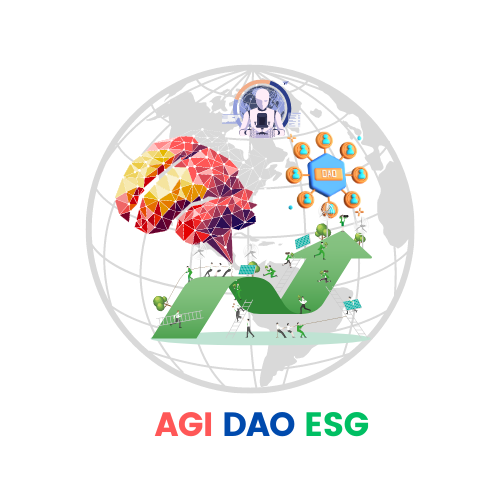A unified approach that merges the concepts of Artificial General Intelligence (AGI), Decentralized Autonomous Organizations (DAOs), and Environmental, Social, and Governance (ESG) criteria presents a fascinating intersection of technology, organizational structure, and sustainability. This integration has the potential to revolutionize the way organizations operate, making them more intelligent, ethical, and sustainable.By combining AGI, DAOs, and ESG criteria, we can envision the creation of intelligent, decentralized organizations that operate based on ethical and sustainable principles. These organizations would leverage AGI to make informed decisions that prioritize environmental protection, social equity, and good governance. At the same time, they would operate under a decentralized model that promotes transparency, accountability, and stakeholder participation.Artificial General Intelligence (AGI) refers to advanced AI systems that possess human-like cognitive abilities, enabling them to understand, learn, and apply knowledge across a wide range of domains. By integrating AGI into organizational decision-making processes, organizations can benefit from its ability to process vast amounts of data, identify patterns, and make predictions. AGI can help organizations assess the potential environmental impact of their actions, evaluate social implications, and ensure good governance practices are in place.Decentralized Autonomous Organizations (DAOs) are organizations that operate without a central authority, relying instead on smart contracts and blockchain technology to facilitate decision-making and governance. DAOs enable stakeholders to participate in decision-making processes and have a say in the organization’s operations. By combining AGI with DAOs, organizations can create intelligent, decentralized decision-making systems that are transparent, accountable, and inclusive.Environmental, Social, and Governance (ESG) criteria are a set of standards that organizations use to assess their impact on the environment, society, and governance practices. By integrating ESG criteria into the decision-making processes of AGI-powered DAOs, organizations can ensure that their actions align with ethical and sustainable principles. AGI can analyze and evaluate the potential environmental impact of different courses of action, assess social implications, and ensure good governance practices are followed.The integration of AGI, DAOs, and ESG criteria can lead to organizations that are not only intelligent and efficient but also socially responsible and environmentally sustainable. These organizations can make data-driven decisions that take into account the long-term consequences of their actions, prioritize the well-being of all stakeholders, and contribute to a more equitable and sustainable future.However, it is important to consider the potential challenges and risks associated with this unified approach. Ethical considerations, data privacy, and the potential for unintended consequences must be carefully addressed. Additionally, the development and implementation of AGI, DAOs, and ESG criteria require collaboration between various stakeholders, including technology experts, policymakers, and sustainability advocates.In conclusion, the integration of Artificial General Intelligence, Decentralized Autonomous Organizations, and Environmental, Social, and Governance criteria presents an exciting opportunity to create intelligent, decentralized organizations that operate based on ethical and sustainable principles. By leveraging AGI, DAOs, and ESG criteria, organizations can make informed decisions that prioritize environmental protection, social equity, and good governance, while promoting transparency, accountability, and stakeholder participation. This unified approach has the potential to revolutionize the way organizations operate and contribute to a more equitable and sustainable future.
The Intersection of Artificial General Intelligence, Decentralized Autonomous Organizations, and Environmental, Social, and Governance Criteria
/

Leave a Reply